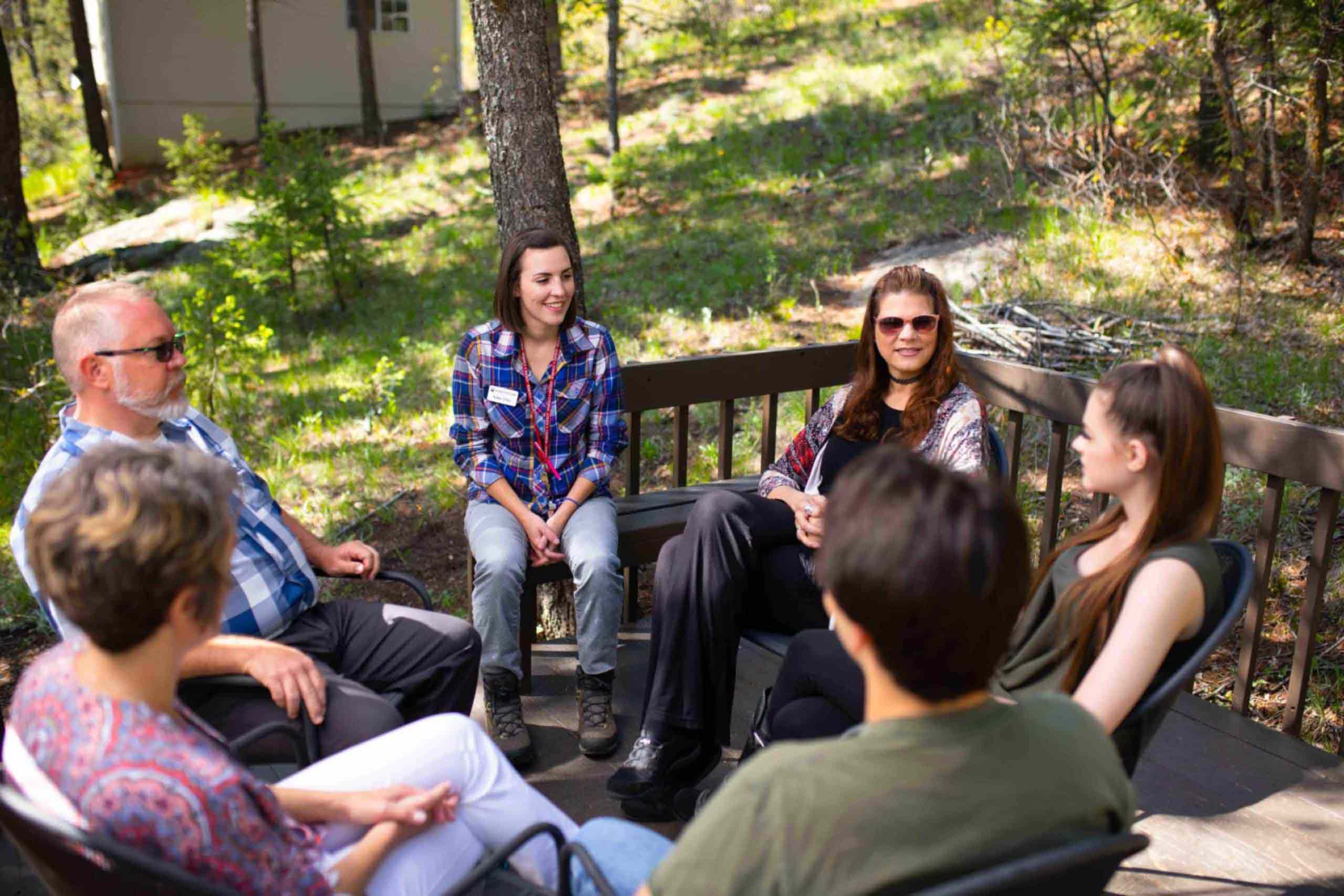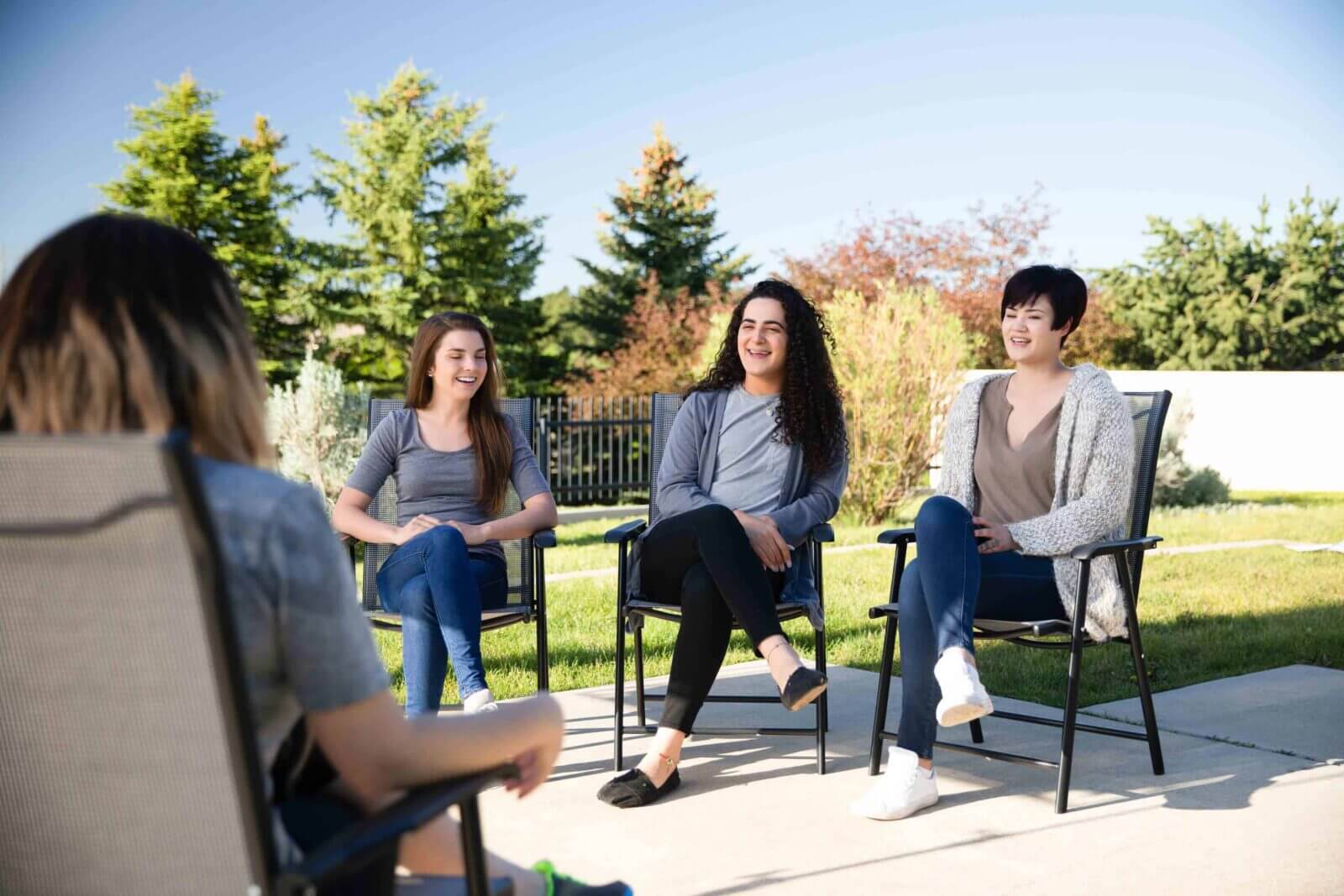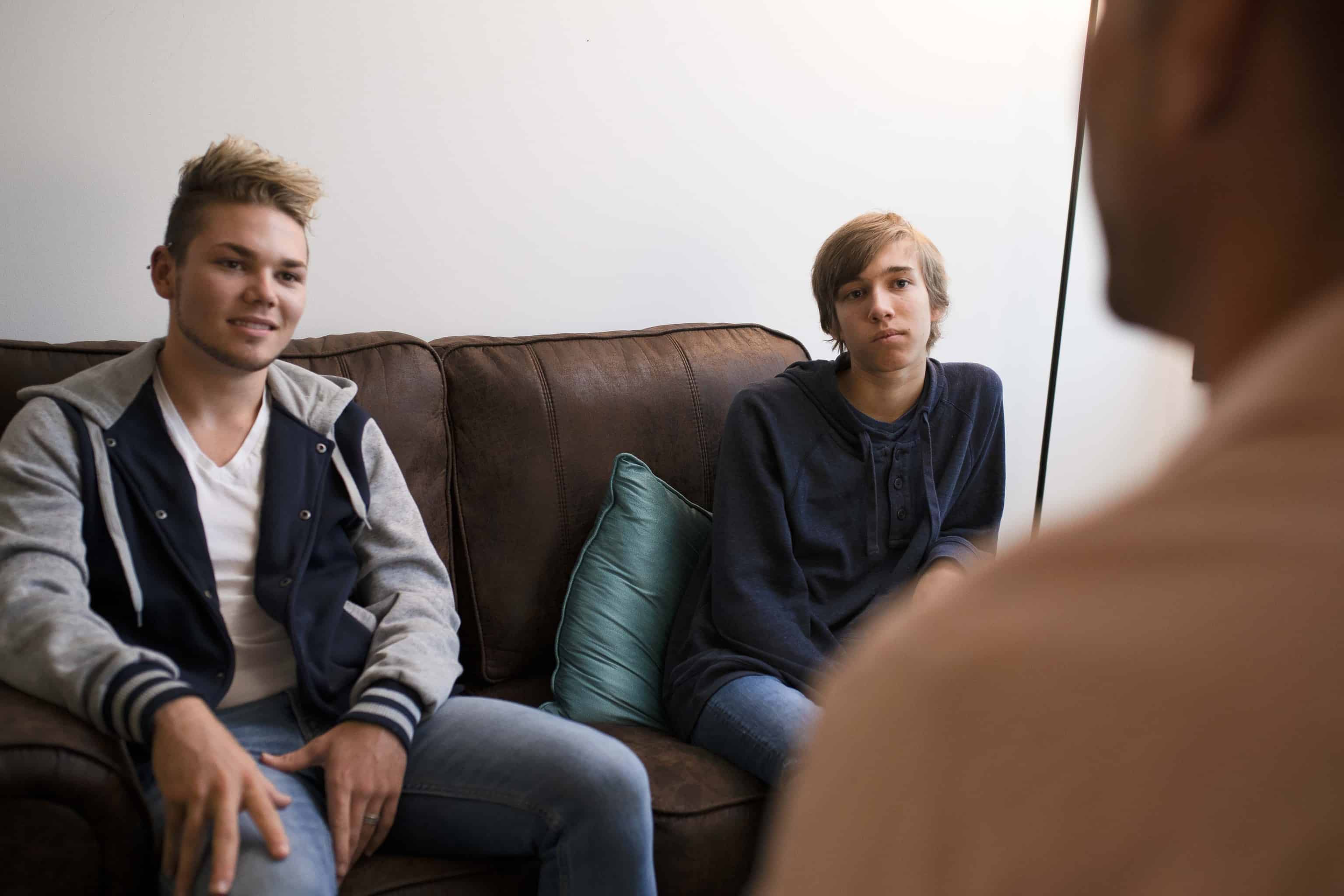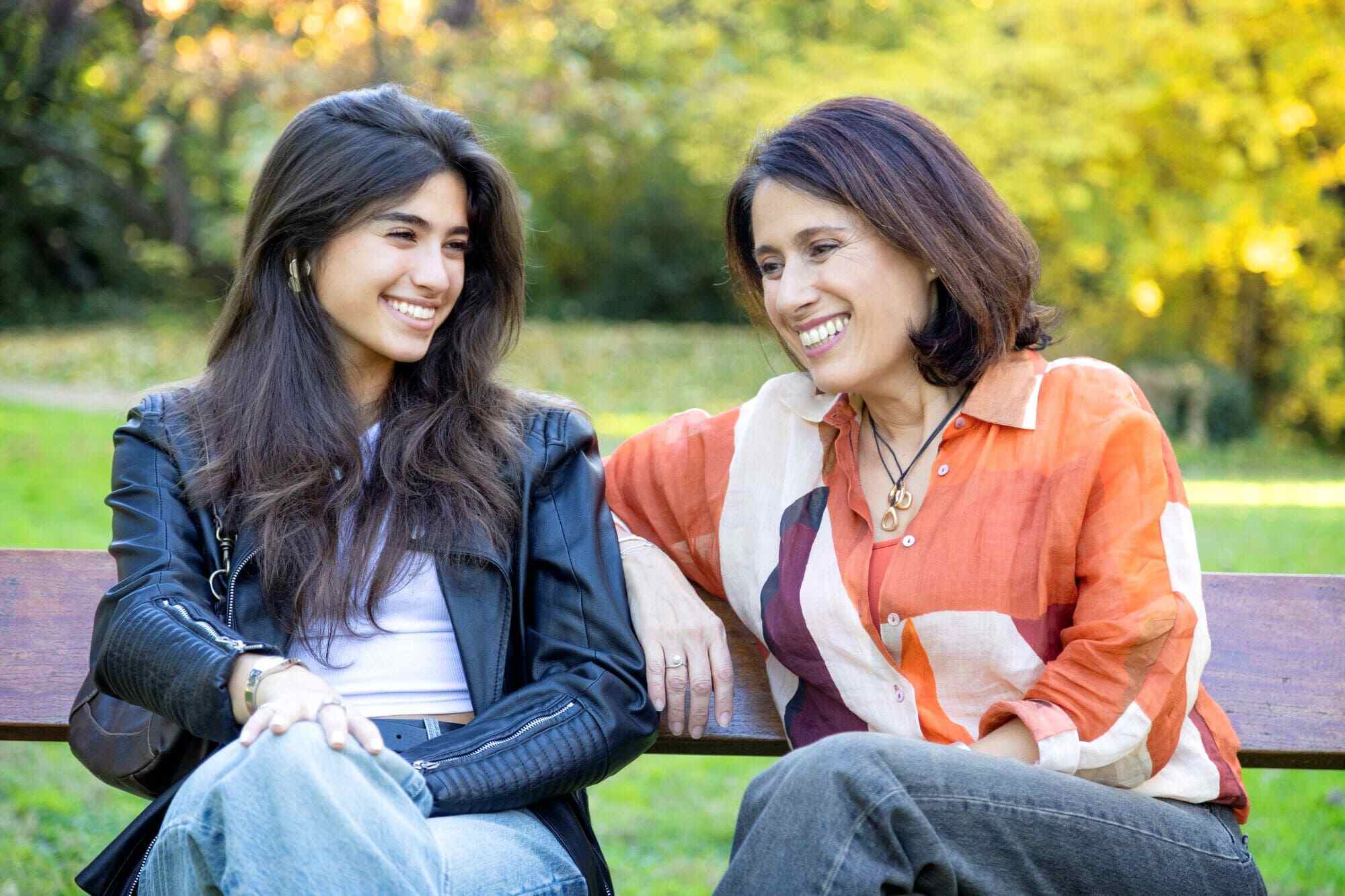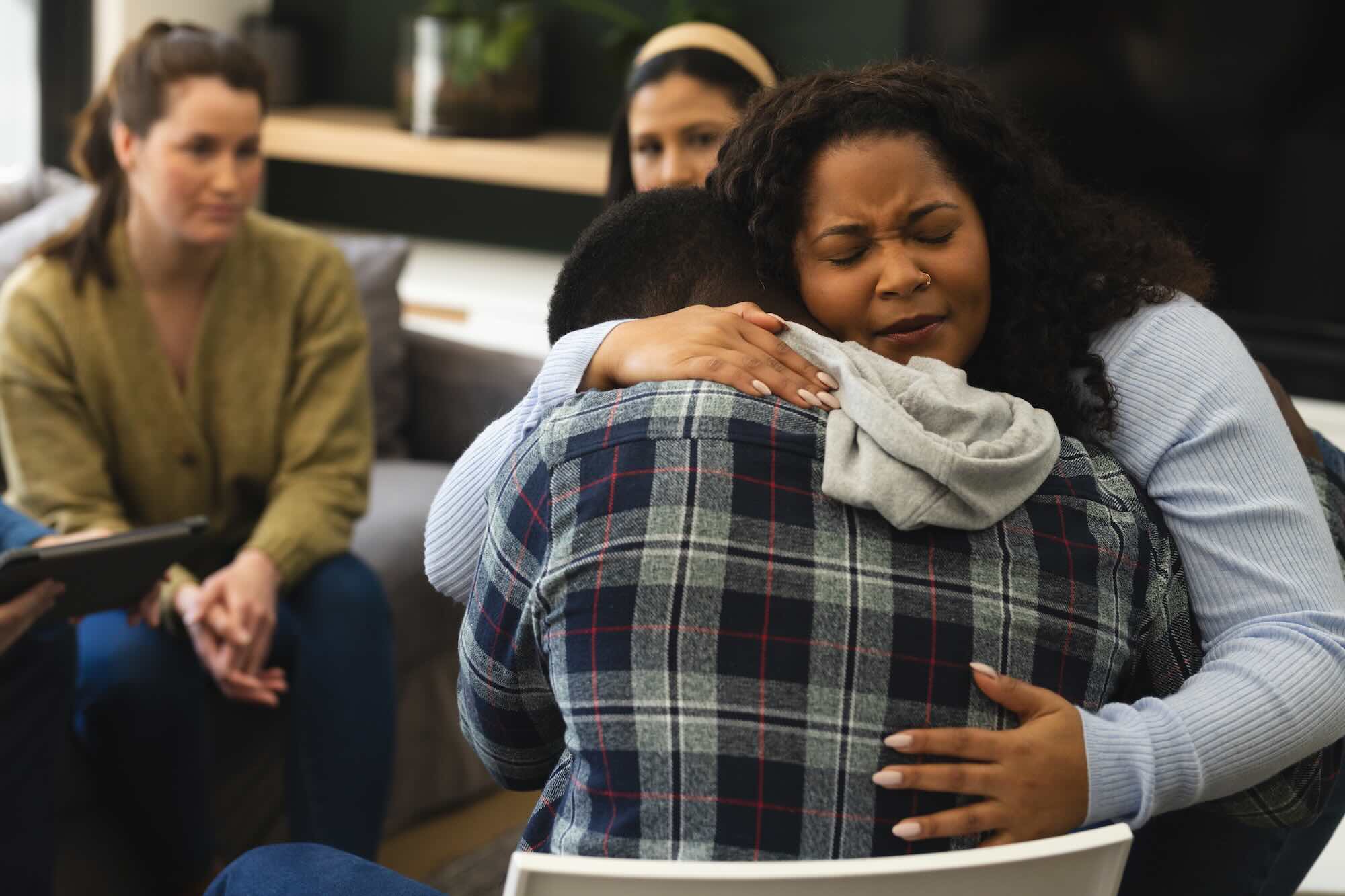Table of Contents
-
- What Is Group Therapy?
- What Is Group Therapy In Mental Health?
- What Is Group Therapy For Addiction Treatment?
- What Are Two Types Of Group Therapy?
- What Are The Goals Of Group Therapy?
- What Are The Benefits Of Group Therapy?
- When Is Group Therapy Most Effective?
- What Is An Example Of Group Therapy?
- What Happens During Group Therapy?
- What Do You Talk About In Group Therapy?
- Does Group Therapy Really Work?
- What Is The Difference Between Family Therapy And Individual Therapy?
- Is Group Therapy Free?
- What Are The Disadvantages Of Group Therapy?
What Is Group Therapy?
Group therapy (short for “group psychotherapy”) is when a therapist treats clients with similar issues in one group session.
A therapist will guide you and your group during a session as the group leader. You will discuss similar topics as you would during individual therapy. The therapist often picks the topics for the session, or the group chooses the topic of the session.
During group therapy, you might just listen to others speak or share your struggles. The therapist helps get people talking or leads the discussion themselves.
Peer support is a huge part of group therapy.
During group therapy, you share your struggles and successes with a small group of other people who have also “been there.”
What Is Group Therapy In Mental Health?
Group therapy in mental health helps clients with similar mental health diagnoses share and learn coping skills.
During a group therapy session in mental health, the therapist will use a therapeutic modality, like cognitive behavioral therapy (CBT) or dialectical behavioral therapy (DBT).
You might also have individual therapy sessions in one of these modalities. You would then bring the skills you learned during individual therapy to a group.
Both CBT and DBT can have exercises to practice different coping skills. During group therapy, you can practice new coping skills with a small group of peers with similar issues.
For example, you might be asked to journal as a coping skill. During a group therapy session, you might journal as a group on the same topic. You can also practice social skills with other group members to practice building relationships with others.
Group therapy in mental health might be part of an inpatient program at a hospital. You might meet others with the same diagnosis, though inpatient programs often have people with different mental health or substance use disorders.
You can also participate in group therapy in an outpatient mental health setting. You might find an outpatient therapist that treats small groups of people, all with similar issues or diagnoses.
Just like individual therapy, group therapy can treat specific mental and behavioral health concerns.
What Is Group Therapy For Addiction Treatment?
Group therapy for addiction treatment helps clients with addiction and substance use disorders share common issues with a therapist’s guidance.
Addiction is complicated. Many people who do not have a substance use disorder might make us feel shame. We might hear things like, “Why can’t you just stop?” or “I don’t understand why you keep doing this!”
But we know that if we could just stop, we would.
Because of shame and stigma, many with addiction or substance use disorders feel alone in their struggles. They might feel that no one understands what they are going through. They might believe that they are weak, hopeless, and out of control.
But you are not alone.
Group therapy can help you relate to others sharing similar issues. You can share with other group members the struggles of dealing with cravings and build a support system.
Group therapy can be helpful for you in the early stages of addiction recovery.
In the group setting, you can talk to others about how your addiction affects you. Other people in your group might have tips or can offer empathy. During a group therapy session, you will realize that you are not alone.
What Are Two Types Of Group Therapy?
The two types of group therapy are open and closed.
Open means that new members can join the group at any time. A new participant might jump in at any point, and the group members might change over time.
During open group therapy, you might have a set number of sessions that do not need to be completed in any order. Group members might have more or less experience, meaning you get a mix of new members and those with more knowledge.
Closed means that only specific group members can participate in sessions. The group has the same members from the start to the end of the sessions.
During closed group therapy, you build skills together, much like a class in school. Everyone begins and ends at the same point. Closed therapy means building relationships with a core group and staying on about the same level.
Both open and closed types have the same benefits as group therapy. You might feel more comfortable getting to know the same people over time, or you might welcome the idea of learning from others at different levels.
What Are The Goals Of Group Therapy?
The goals of group therapy sessions are to:
- Peer support
- Develop coping skills
- Understanding yourself better
- Provide positive support
- Give and receive helpful feedback
- Reduce feelings of loneliness
The goals of group therapy are similar to individual therapy. You learn to manage your mental health, addiction, and other issues. However, the group setting offers more support from peers dealing with similar issues.
What Are The Benefits Of Group Therapy?
The benefits of group therapy are:
- Less expensive than individual therapy
- Relate to others in the group
- Practice social and communication skills
- Work on coping skills with peers
- Finding role models have similar issues
- Building self-esteem
- Sense of community
Since group therapy sessions last about as long as individual sessions, the cost is usually lower. The therapist can treat more people at the same time and bring them together. Group members are working toward a common goal to support one another through recovery.
When Is Group Therapy Most Effective?
Group therapy is most effective when everyone has similar issues, allows for everyone to speak, and the group has a shared goal.
Group sessions during an inpatient hospital stay might have people with different problems. You might struggle to relate to others in these groups. After an inpatient stay, you can seek an outpatient therapy group that suits your needs.
You can find groups that treat similar issues that you are dealing with. Group therapy is available for things like substance use disorders, depression, anxiety, bipolar disorder, grief, and co-occurring disorders.
You might also find group therapy focused on a modality that works for you.
Group therapists will usually teach the same modality to everyone in the group. If you find DBT helpful, you might join a group that works on DBT skills, like strong emotions, relationship issues, and black-and-white thinking.
You might also find a group based on experiential therapy, like art, music, or outdoor therapy. Not only will you work on your mental health or substance abuse, but you will meet others sharing your interests.
Group therapy sessions can also be built around the same goals.
When other people share the same goals in therapy, they can work together to help one another. Your group might revolve around a goal of solving a specific issue or problem, like a family issue.
What Is An Example Of Group Therapy?
A common example of group therapy is family therapy.
During family therapy, or family systems therapy, the therapist leads the family through their issues. The family meets as a group to work out issues while the therapist acts as the group leader. The therapist can help families talk through conflicts and communicate more effectively.
What Happens During Group Therapy?
During group therapy, you speak to both peers and a therapist about the same issues you would during individual therapy.
A group therapy session might begin with a check-in of how everyone is doing since the last time. You might also re-cap from the last session to continue building skills. The therapist is the group leader, setting the tone of the group.
Sometimes, the therapist picks the topic for the sessions. They might have a set of skills they are helping everyone build. The therapist can open the meeting with the topic as everyone shares or practices new coping skills.
However, sometimes, a current issue can be the topic for the session. For example, you might bring up a fight that you had with your parents. The session can then be a group discussion on dealing with conflict or relationships with parents.
The therapist will help keep everyone focused and engaged. They might ask you to speak or participate in an exercise. The therapist might speak very little. Often, the group can lead the session as each person continues the conversation and listens to one another.
What Do You Talk About In Group Therapy?
In group therapy, you talk about any issues related to your mental health issue or substance use disorder.
Group therapy sessions can have a range of different topics. You might talk about specific coping skills or similar problems with other group members.
The group might select what topic they would like to discuss or talk about how they relate to the topic of the session. Group therapy focuses on building coping skills while getting group support.
You can dive into topics like:
- Relationship issues
- Coping skills
- Trauma
- Family
- Anger management
- Grief and loss
- Managing emotions
- Mental health
- Anxiety
- Depression
- Self-esteem
- Drug addiction
- Relapse prevention
The range of topics is wide open in group therapy. Each group member might have something new they would like to explore. The group discussion can cover many topics in one session, though the therapist might want to keep everyone focused on one thing.
Group therapy allows for members to take charge of the session. As the group gets comfortable, they might start to lead the sessions with the skills they have learned during a mental health or addiction recovery.
Does Group Therapy Really Work?
Yes! Group therapy works for many clients with many different issues.
You might fear speaking about your issues with others if you are new to group therapy. As you hear that others have similar problems and issues, you might feel more confident to speak up.
Some days, during individual therapy, you might not feel like talking very much. You might have little to say and feel that you are spending the hour getting little out of the session.
During group therapy, you can learn from other group members even if you have nothing to say.
You don’t need to talk the whole time, which might take some pressure off. Rather, you can listen to others and still get something out of your session. On days that you don’t talk, you can still get something out of it!
What Is The Difference Between Family Therapy And Individual Therapy?
During family therapy, you and your family meet with a therapist together.
The issues we face during mental health and addiction recovery might impact our loved ones. We might have relationship issues with our families that need to be addressed to help the family unit.
Substance use disorders and mental health problems can challenge even the strongest bonds of the family.
When we have issues with our family, we might feel stressed or lack a support system. Family therapy helps strengthen the bonds of the family to build better and healthier relationships.
When one person in the family struggles with mental health or addiction, everyone struggles.
Family therapy helps you bring things out into the open with your family, as a therapist will guide you and mediate any conflicts. These sessions also allow your family to discuss the impact of seeing you suffer and help them cope.
Sometimes, family members keep things together for our sake. They might not want us to feel bad, as they know that these issues are not our fault. But, to create a supportive family unit, we need to address the stressors occurring at home.
Family members might also struggle to help a person with mental health or substance use disorders. They might not know how to help their loved one. Family therapy can help everyone discuss their needs and learn how to support one another.
Is Family Therapy Better Than Individual Therapy?
Both family therapy and individual therapy can be helpful to you during your recovery.
Family therapy can be helpful for your treatment program. You might thrive in individual therapy, but if your family doesn’t support you, you might fall back.
Family therapy is not necessarily better than individual therapy. However, family therapy helps you get the support you will need at home during your mental health or addiction recovery.
During family therapy, you might have individual therapy sessions along with group sessions. You and your family members might talk individually with the therapist and then come together as a unit.
In a family therapy session, the therapist can observe the dynamics at play. They can get a glimpse of how the family functions and help find solutions for any issues occurring at home.
Is Group Therapy Free?
Group therapy isn’t free, but the cost is often less than individual therapy.
Insurance and health care plans might pay some or all of the costs of group therapy, just like individual therapy.
Is A Support Group The Same As Group Therapy?
Support Groups and group therapy share some similarities, but support groups are not led by a trained therapist.
Support groups, like 12-step programs, are run by peers in recovery and often have a group leader to facilitate. Support groups, like alcoholics anonymous (AA) and narcotics anonymous (NA), are free peer support groups that many in addiction recovery find helpful.
While you can get peer support from a 12-step program or other support groups, you won’t have the expertise of a therapist to help you with complex issues. Peers can help you talk about issues and share empathy, but they won’t have the expertise of a therapist.
However, group therapy is only for a short amount of time to deal with specific issues. Support groups, like AA or NA, can offer support for a lifetime in addiction recovery. Support groups are helpful for relapse prevention and part of the recovery process.
Parents and loved ones can also attend support groups, like Al-Anon and Alateen. Many treatment centers have support groups for families, parents, and loved ones to attend.
What Are The Disadvantages Of Group Therapy?
Some disadvantages of group therapy are:
- Potential for conflicts among group members
- Feeling uncomfortable sharing with a group
- You might not feel like you get enough individual attention
- Sharing private health information with others
- Need to trust the group, which can be difficult for those with trust issues
Each person must decide whether group therapy will be helpful for them.
Group therapy offers many advantages, but it is not for everyone. You might feel more comfortable in individual therapy. Many treatment centers offer both individual and group therapy, along with many other effective treatment strategies, to help you find the right fit.
Group therapy for substance use disorders can be an essential part of your treatment program. For more on the benefits of group therapy, call Sandstone Care today at (888) 850-1890. Let’s take the next steps together!

